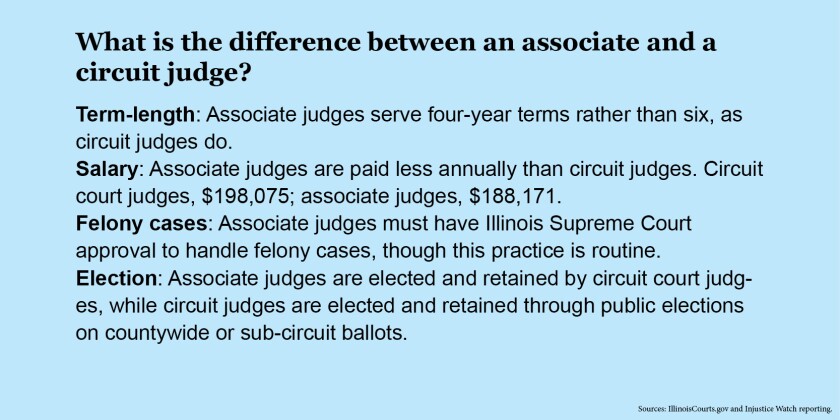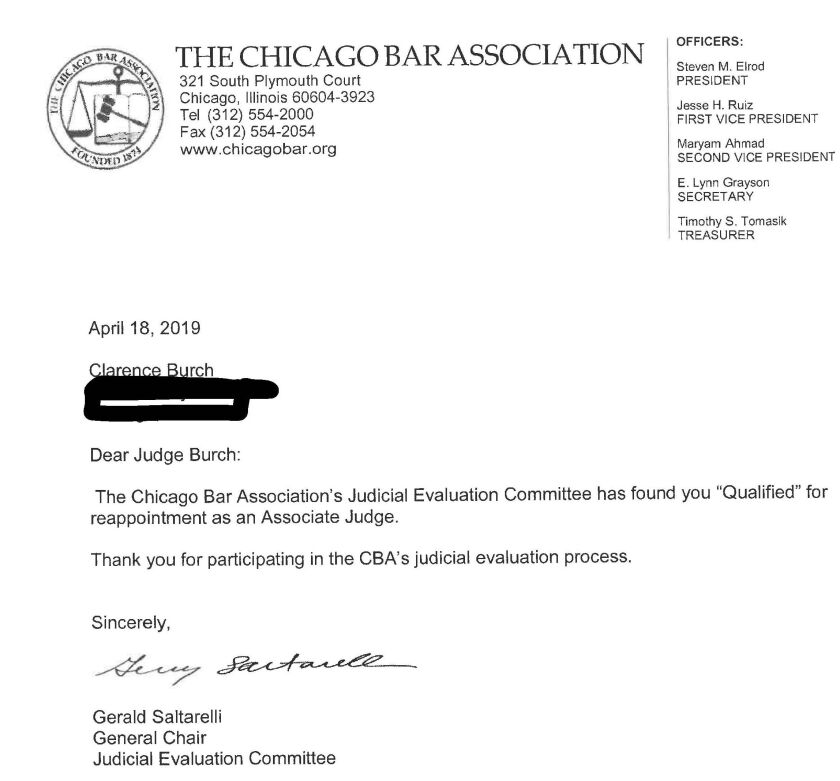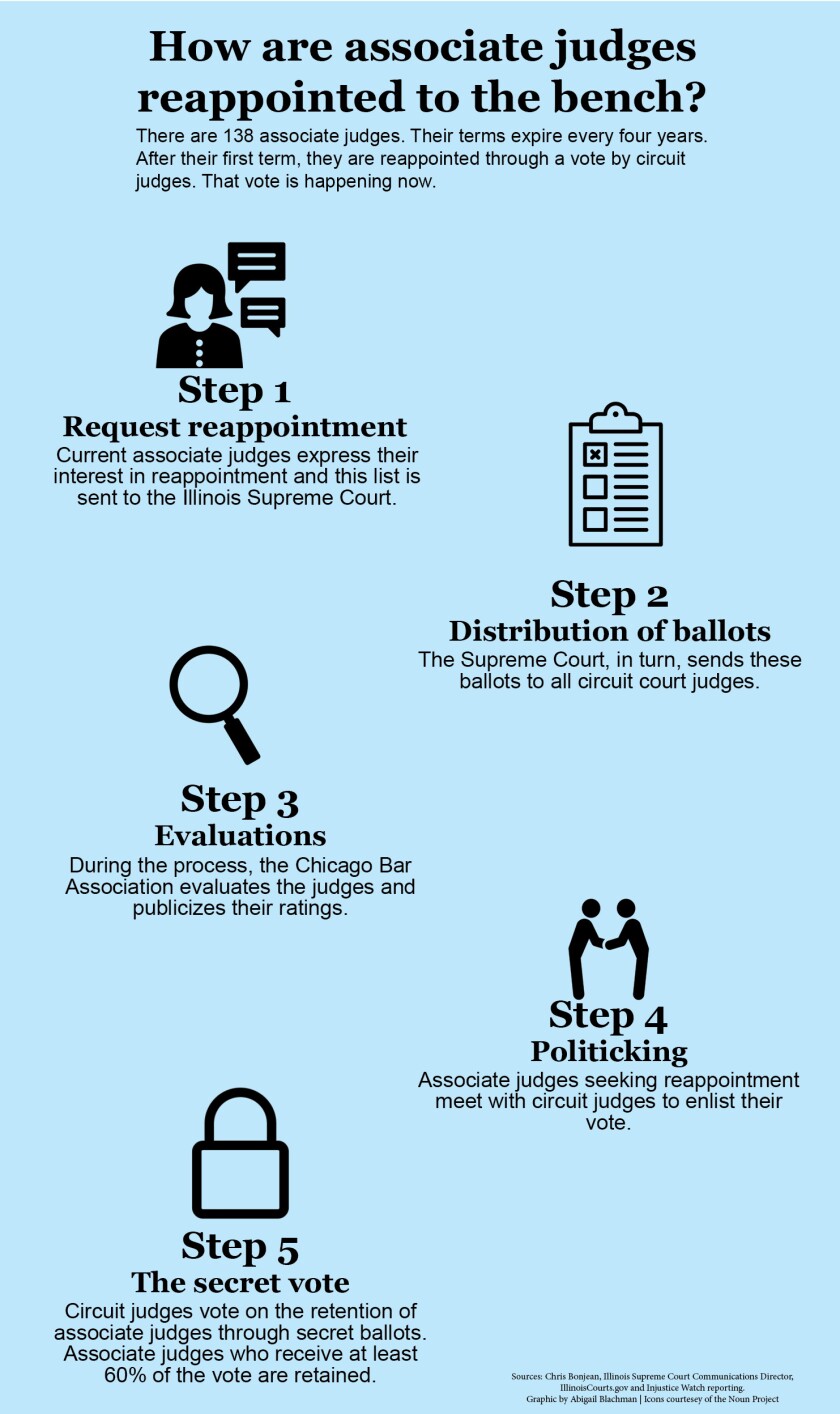A secret vote is underway to determine which of 138 Cook County judges should keep their jobs.
If you didn’t know about it, that’s no surprise. The only eligible voters for this insiders-only balloting are Cook County circuit judges. It’s up to them to decide who among the current associate judges should stay on the bench, getting new, four-year terms.
Votes are being cast until the end of May.
Supporters of the system say it results in merit selection to a greater degree than the public elections in which circuit judges are chosen.
“You’re getting a much more informed and participatory active electorate, and they will, to some extent, be much more familiar with the candidates than the general public,” says David Melton, of the Chicago Council of Lawyers.
“The associate-judge process is probably the closest thing to merit selection that we have,” says now-retired Judge Daniel Locallo, who served at the circuit and associate level.
Others find fault with the process.
”Most of us have no idea as to whether associate judges do their job and do it adequately,” says one circuit judge, speaking on the condition of anonymity.
The judges who can vote aren’t told anything about whether the presiding judges or chief judge think particular associate judges have been doing a good job, the judge says: “Nothing. And yet we vote.”
And that’s a judge. Most other people wouldn’t even know the difference between associate judges and circuit judges. Beside being selected differently, associate judges are paid a little less, and their terms expire every four years, unlike the six-year terms circuit judges get.
All Cook County judges are assigned to the same courtrooms. Under state law, associate judges are required to have Illinois Supreme Court approval before they can oversee felony cases, but that approval is routine.
When elections are held for circuit judge, new candidates and those running to be retained on the bench are screened by the Chicago Bar Association, the Chicago Council of Lawyers, the Illinois State Bar Association and nine special interest bar groups. For associate judges, only the Chicago Bar Association even tries to evaluate the candidates seeking retention.
Many lawyers who want to be a judge seek associate posts to avoid the politics of running for circuit judge. Also, candidates from minority groups generally fare poorly in countywide judicial elections.
Even though the selection of associate judges is intended to be more about merit, political connections don’t seem to hurt.
Donald Panarese Jr. and Joseph Panarese are on the current ballot, seeking new terms. Their father was the late Cook County Circuit Judge Donald Panarese Sr.
Myron Mackoff — the son of retired Cook County Circuit Judge Benjamin Mackoff — is one of five associate judges chosen by the circuit judges last year after filling temporary vacancies on the circuit court and then losing in the primary election race for those seats.
Judge James B. Linn, who’s seeking a new, four-year term as an associate judge, is the son of the late appellate Judge David Linn.
Arthur Hill, who was an assistant Cook County state’s attorney when Richard M. Daley was the elected top prosecutor, was appointed to the CTA board and then the Northeastern Illinois Planning Commission before being appointed as an associate judge in 2003.
The Chicago Bar Association rated the associate judges and failed to recommend only two judges who submitted information to be considered: Luciano Panici and Richard Schwind.
“Even though the public is not voting on associate judges, we feel that they should be informed,” Terry Murphy, executive director of the Chicago Bar Association, said in releasing the ratings.
Murphy declined to make past ratings available, saying that information is confidential.
A note submitted by the bar association to the court system with the 2015 ratings shows it was the bar, not the judges, that asked for the confidentiality.
Panici, who is assigned to a bond and felony preliminary hearing court, was cited by the bar group for “improper, insensitive and evidence bias” treatment of defendants. The association wrote that Panici, first appointed in 2001, has publicly expressed a view that nearly all the defendants who appear before him are guilty and said he “exhibits a casual attitude regarding whether the state has met the burden of proof.”
In a letter to colleagues “requesting your vote for re-appointment as Associate Judge,” Panici terms the bar’s evaluation “clearly erroneous” and says, “I categorically denounce the findings. . . . At no point during the interview or elsewhere have I ever expressed the view that nearly all of the defendants who appear before me are guilty.”
Schwind, an associate judge since 2012, was reassigned to the First Municipal District last year, after WBEZ reported he told an African American defendant who was on trial for hitting a man who had used a racial slur against him, “You were never a slave.” The bar association said Schwind’s “statements to minority litigants appearing before him are insensitive, improper and evidence bias.”
After the circuit judges received that review, they got a letter from Circuit Judge Stephen A. Kozicki, who argued on behalf of Schwind. Kozicki wrote that he had admired Schwind’s legal work and that he has an “excellent reputation for honesty and fairness.”
Kozicki wrote that he’d seen Schwind as lector at a Sunday Mass service and also considered him to be an excellent father and husband.
“I urge you to trust my 33 years of direct evidence of Judge Schwind’s qualifications to remain an associate judge of Cook County,” Kozicki wrote.
Taking a different view, Circuit Judge Robert Balanoff urged fellow circuit judges to “Vote NO on Schwind and Panici.” Praising the Chicago Bar Association’s evaluation process, Balanoff wrote that he hoped his colleagues would “avoid the embarrassment of retaining judges who do not reflect the high standard we want to have on the bench here in Cook County.”
Given the bar’s “Not Recommended” ratings of Schwind and Panici, Balanoff wrote, “If they are retained, how would we explain that 60% of us thought this behavior was acceptable for a judge in Cook County? At a time when the courts are under attack, we must demand that judges have integrity, be unbiased, and believe that defendants are innocent until proven guilty.”
Alecia Richards, John Seasly and Alejandro Fernández Sanabria report for Injustice Watch, a nonpartisan, not-for-profit journalism organization that conducts in-depth research to expose institutional failures that obstruct justice and equality.










